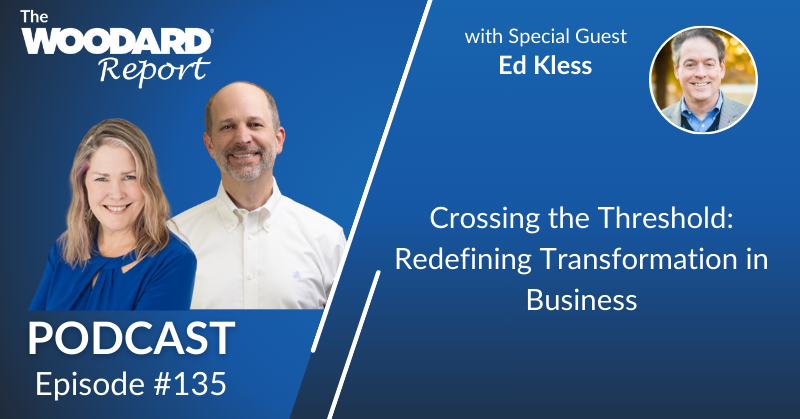In episode 135 of The Woodard Report Podcast, Joe Woodard is joined by Ed Kless, co-founder of Threshold, to explore the philosophy behind Threshold and the broader idea of the transformation economy. The conversation examines why professionals must go beyond services and experiences to deliver true transformation for their clients.
Why a “revelation”?
Joe asks Ed why Threshold describes its business philosophy as a revelation. Ed responds by drawing on lessons from Peter Block and their own decades of advising:
“And when we say radical, we mean the Latin root of radical is the same as the word radish. It means from the root. It means getting back to your roots. And that's what we are proposing or talking about in this revelation.”
He explains that many professionals are stuck in a fee-for-service model that causes both business and personal strain. Threshold’s revelation is about returning to the original purpose of being a professional: professing a belief and guiding others.
The progression of economic value
Ed outlines the stages defined by Joseph Pine and James Gilmore in The Experience Economy:
- Commodities → raw materials (sugar, eggs, wheat).
- Goods → products created from those commodities (a cake).
- Services → added customization (a decorated cake).
- Experiences → the full event (a Chuck E. Cheese birthday party).
- Transformation → sustained change in the client.
As Ed explains:
“Each economic era, each offering subsumes the prior era.”
In other words, transformations include services and experiences but go further by producing lasting change in the client’s behavior or identity.
From experience to transformation
Transformation, Ed says, is always a journey from one state to another:
“A transformation is always a from-to, it’s a from A to B.”
He gives practical examples: moving a client from on-premises software to the cloud, or developing a user into the organizational champion for an app. These aren’t just outcomes, but they permanently change how the client operates.
Joe reinforces this with his own legal example:
“…he nurtured me through the process… He reinforced constantly the importance of maintaining compliance… and that transformed the way I engage my employees.”
Eataly and the role of strategy
To illustrate how all economic levels can coexist, Ed cites Eataly:
“So, here’s one store that has all of them. You can buy peppers, you can buy beef, you can buy a complete meal, you can also buy an experience of taking a class or dining… Or I can go take classes and become a better Italian cook and transform myself.”
For firms, the key takeaway is that strategy matters. Trying to sell both low-cost services and premium transformations creates confusion. As Ed warns:
“Do you want to be McDonald’s or Morton’s? And you really can't confuse the marketplace because if you aspire to be Morton's or have Morton's customers, but then you're also taking all of these McDonald's customers well, people are confused.”
Vision as revelation
Joe and Ed stress the importance of vision in guiding professionals toward transformation. Vision, they say, isn’t simply set, but it’s revealed:
“CEOs don’t determine the vision. They reveal the vision.”
According to Woodard’s framework, vision emerges at the intersection of three things:
- 1. Who you are
- 2. The change you want to see in the world
- 3. The higher principle you follow
Why it matters now
The episode closes with a sense of urgency: with AI poised to take over much service work, firms must move up the value chain.
“If you’re making your money on the service work and the service work is about to be done by the bots imminently, and you’re not offering any of these other transformative layers, then you may find yourself in a shrinking profession.”
Practical First Steps
During the conversation, Ed pointed to the Revelation document available at thresholdnow.com/revelation as a resource for firms that want to better understand transformation. He emphasized that transformation isn’t about incremental tweaks, but about moving from one state to another, guided by a revealed vision rather than one you create for yourself.
Ed explained that firms can start by considering the “from–to” journey for their clients:
- From compliance-only to advisory.
- From transactional services to transformational guidance.
- From acting upon clients to acting with clients toward meaningful change.
By reflecting on these shifts, accountants can begin to align their practices with a vision that truly transforms the people and businesses they serve.
Listen to the full episode and subscribe to The Woodard Report Podcast
🎧 Listen to the full episode at woodard.com/podcast.
Enjoyed this episode? Subscribe to The Woodard Report Podcast on your favorite platform for weekly insights that move your practice—and your life—forward.
Thank you to our show sponsor, Bill, your financial operations platform. Bill is the intelligent way to create and pay bills, send invoices, manage expenses, control budgets and access the credit your business needs to grow all in one platform.
This article was generated by AI and reviewed and edited by a human.
.png?width=150&height=63&name=TWRlogo-regmark_blueblack%20(1).png)
.png)










Do you have questions about this article? Email us and let us know > info@woodard.com
Comments: